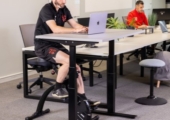September 8, 2017
London’s commercial office market slows down as occupiers choose to stay put

Following a period of stability over the last few quarters, despite the Brexit vote, London’s office market is increasingly coming under pressure, according to Clutton’s London Office Bulletin for Summer 2017. According to Ralph Pearson, Clutton’s head of commercial agency – this is due to reduced levels of occupier activity post Brexit where there is increased instances of tenants renewing leases rather than electing to relocate. Although take up in the second quarter of this year was close to the five-year average, the main reason for this was due to activity carried out by WeWork, which accounted for the two largest deals – involving a total of 425,000 sq ft in Shaftesbury Avenue and at South Bank Place. The market has since begun to stagnate, and so far, for the third quarter of this year quoted rents have slipped across much of central London with rent free periods continuing to lengthen.





 American office workers think it’s twice as difficult for remote workers to build relationships with the boss, make work friends, collaborate with their team and navigate the workplace culture than in-office workers, according to recent research. The “Reality of the Remote Worker Report,” claims that remote workers tend to have their presence go by unnoticed, with 43 percent of office workers believing it’s harder for remote workers to be seen in the workplace than those non-remote. The report, conducted online amongst over 1,500 US workers by
American office workers think it’s twice as difficult for remote workers to build relationships with the boss, make work friends, collaborate with their team and navigate the workplace culture than in-office workers, according to recent research. The “Reality of the Remote Worker Report,” claims that remote workers tend to have their presence go by unnoticed, with 43 percent of office workers believing it’s harder for remote workers to be seen in the workplace than those non-remote. The report, conducted online amongst over 1,500 US workers by 




 The creative industries sector accounted for over a third 35 percent) of take-up in the regional office market in the first half of the year, with this sector in particular driving the co-working revolution and the provision of flexible office space. Latest figures in CBRE’s H1 2017 Property Perspective, which monitors the performance of ten regional cities, overall, the UK’s regional office markets saw continued demand in the first half of 2017, with office take-up reaching 2.8 million sq ft, only slightly lower than the five-year average. For the first half of 2017, several cities witnessed improved levels of take-up when compared with the first half of 2016, these include Aberdeen, Edinburgh, Leeds and Manchester. Select locations such as Reading, Maidenhead and Watford also saw a continuation of record rents being set during the first half of the year, which has largely been driven by the delivery of new developments.
The creative industries sector accounted for over a third 35 percent) of take-up in the regional office market in the first half of the year, with this sector in particular driving the co-working revolution and the provision of flexible office space. Latest figures in CBRE’s H1 2017 Property Perspective, which monitors the performance of ten regional cities, overall, the UK’s regional office markets saw continued demand in the first half of 2017, with office take-up reaching 2.8 million sq ft, only slightly lower than the five-year average. For the first half of 2017, several cities witnessed improved levels of take-up when compared with the first half of 2016, these include Aberdeen, Edinburgh, Leeds and Manchester. Select locations such as Reading, Maidenhead and Watford also saw a continuation of record rents being set during the first half of the year, which has largely been driven by the delivery of new developments.


 It may still be the summer holiday season but if you’re finding it easier than you’d expect to get hold of people, it’s because they’re probably checking their emails on the beach. A new survey by Wrike claims that 73 per cent of British employees work while on holiday. The main reason? They can’t relax unless they know everything is going okay in the office. Those from France and Germany have a slightly more relaxed state-of-mind. While 35 per cent of UK workers said they feel better keeping in touch with the office and the Germans aren’t that far behind, with 30 per cent saying keeping one eye on their work was the key to relaxation; in France only 22 per cent felt the same. Brits also said that working while away was because they were hoping to minimise the amount of work they would have to come back to (22 per cent).
It may still be the summer holiday season but if you’re finding it easier than you’d expect to get hold of people, it’s because they’re probably checking their emails on the beach. A new survey by Wrike claims that 73 per cent of British employees work while on holiday. The main reason? They can’t relax unless they know everything is going okay in the office. Those from France and Germany have a slightly more relaxed state-of-mind. While 35 per cent of UK workers said they feel better keeping in touch with the office and the Germans aren’t that far behind, with 30 per cent saying keeping one eye on their work was the key to relaxation; in France only 22 per cent felt the same. Brits also said that working while away was because they were hoping to minimise the amount of work they would have to come back to (22 per cent).
 The digitisation of the workplace may be seen as a boon to productivity, but that also depends on how well it’s being adopted by the workforce. A new survey claims that one in five (23 percent) UK office workers struggle with technology; and helping to solve the problems of these less tech-savvy employees takes up an average of 17 minutes of their colleague’s working day. The survey from memory and storage firm
The digitisation of the workplace may be seen as a boon to productivity, but that also depends on how well it’s being adopted by the workforce. A new survey claims that one in five (23 percent) UK office workers struggle with technology; and helping to solve the problems of these less tech-savvy employees takes up an average of 17 minutes of their colleague’s working day. The survey from memory and storage firm 


 Commercial property occupiers remain cautious about the future, and hard data indicates that demand has, so far, been largely unaffected by Brexit, claims a new report from the British Council for Offices (BCO) . ‘Brexit and its Potential Impact on Office Demand’, examines how Brexit might impact on demand for office space on a national and regional basis through to 2022. According to the report, almost one year on from the Brexit vote the situation is one of uncertainty, feeding through to slower growth, with ‘an almost palpable sense that choppy waters lie ahead, particularly with regard to trade and movement of labour’. However, businesses continue to make long-term investments in the national economy and even in the City, some large investment banks have committed to large new office buildings. There is much variation in the relative performance of the UK’s major office centres, though, with some expanding and others apparently in decline.
Commercial property occupiers remain cautious about the future, and hard data indicates that demand has, so far, been largely unaffected by Brexit, claims a new report from the British Council for Offices (BCO) . ‘Brexit and its Potential Impact on Office Demand’, examines how Brexit might impact on demand for office space on a national and regional basis through to 2022. According to the report, almost one year on from the Brexit vote the situation is one of uncertainty, feeding through to slower growth, with ‘an almost palpable sense that choppy waters lie ahead, particularly with regard to trade and movement of labour’. However, businesses continue to make long-term investments in the national economy and even in the City, some large investment banks have committed to large new office buildings. There is much variation in the relative performance of the UK’s major office centres, though, with some expanding and others apparently in decline.
 The quality of the cycling facilities being offered by many workplaces are currently falling short and risk undermining a Government drive to increase the number of people cycling to work; as according to new research published by the British Council for Offices, 16 percent of office workers claim that inadequate facilities are discouraging them from considering commuting by bike. In April, the Department for Transport stated an aim to double the number of cycling stages, defined as a change in the form of transport as part of a longer “trip” (e.g. cycling to the train station before catching a train to work), from 0.8 billion stages in 2013 to 1.6 billion in 2025. However, new research, commissioned by the British Council for Offices and carried out by Remit Consulting, finds that whilst 83 percent of workplaces in the UK offer some form of bike storage, less than half (47 percent) of this is covered and secure. Improved parking facilities could help increase numbers of those cycling to work, with 16 percent of office workers surveyed saying that better bike storage would encourage them to do so.
The quality of the cycling facilities being offered by many workplaces are currently falling short and risk undermining a Government drive to increase the number of people cycling to work; as according to new research published by the British Council for Offices, 16 percent of office workers claim that inadequate facilities are discouraging them from considering commuting by bike. In April, the Department for Transport stated an aim to double the number of cycling stages, defined as a change in the form of transport as part of a longer “trip” (e.g. cycling to the train station before catching a train to work), from 0.8 billion stages in 2013 to 1.6 billion in 2025. However, new research, commissioned by the British Council for Offices and carried out by Remit Consulting, finds that whilst 83 percent of workplaces in the UK offer some form of bike storage, less than half (47 percent) of this is covered and secure. Improved parking facilities could help increase numbers of those cycling to work, with 16 percent of office workers surveyed saying that better bike storage would encourage them to do so.









August 2, 2017
Whatever you might be told, this is not the Office of the Future
by Mark Eltringham • Comment, Facilities management, Technology, Workplace design
More →